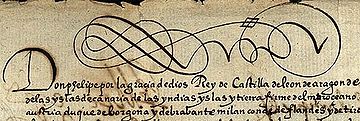
EuroDocs: Online Sources for European History
Encyclopedia
EuroDocs: Online Sources for European History is a digital history
portal that offers links to online facsimiles, transcriptions, and translations of European primary historical sources. The sponsoring organization is the Harold B. Lee Library
at Brigham Young University
, where it was begun in 1995 by Richard Hacken, European Studies Bibliographer.

as well as to sites for “Medieval and Renaissance Europe” and for “Europe as a Supranational Region”.
Countries include:
Jesse Hurlbut of the French and Italian Department has assembled DScriptorium (“D” stands for “digital”), an online image collection of medieval manuscripts.
The page for Spain features facsimiles and transcriptions of previously unpublished, late fifteenth-century letters of King Philip II held in the L. Tom Perry Special Collections Library.
In cooperation with Centro Interuniversitario di Ricerche sul Viaggio in Italia, CIRVI, an international research center housed in Turin, Italy, and initially as part of a sister-city relationship between the 2002 and 2006 Winter Olympic venues, digitization of Accounts of American Travelers to Italy is ongoing – from Henry Adams to Washington Irving, from Harriet Beecher Stowe to Mark Twain. The same Italian page will soon be able to point to multi-spectral images of the Herculaneum papyri being worked on by Roger Macfarlane of the Humanities Department.
Monaco’s history – from a barren rock fortress protecting the marine interests of the Holy Roman Empire to a principality sheltering high rollers and billionaires – is being documented online with BYU efforts in league with European archives.
A number of EuroDocs pages point to the World War I Document Archive, a high-traffic attraction on the BYU Library server, among whose sources are found hundreds of transcribed Austro-Hungarian documents on the 1914 outbreak of war. The library was also fortunate to get ownership of complete copies of the original Eisenhower Communiqués, a collection of dispatches documenting the Allied advance across Europe after D-Day in 1944, so that these typescripts and their searchable transcriptions could become a part of the HBLL’s digital collections.
interface.
Since the site is in a wiki structure historians, archivists, and other interested collaborators are welcome, by writing to the wikimaster, to add links to primary documents online or to transcribe and add important documents available to them.
Digital history
Digital history is the use of digital media and tools for historical practice, presentation, analysis, and research. It is a branch of the Digital Humanities and an outgrowth of Quantitative history, Cliometrics, and History and Computing...
portal that offers links to online facsimiles, transcriptions, and translations of European primary historical sources. The sponsoring organization is the Harold B. Lee Library
Harold B. Lee Library
The Harold B. Lee Library , located in Provo, Utah, is the main academic library of Brigham Young University, the largest religious and second-largest private university in the United States. The library has approximately of shelving for the more than 6 million items in its various collections, as...
at Brigham Young University
Brigham Young University
Brigham Young University is a private university located in Provo, Utah. It is owned and operated by The Church of Jesus Christ of Latter-day Saints , and is the United States' largest religious university and third-largest private university.Approximately 98% of the university's 34,000 students...
, where it was begun in 1995 by Richard Hacken, European Studies Bibliographer.

Countries Documented
The main page of EuroDocs points to 46 separate web indexes for countries and city-states of Europe,as well as to sites for “Medieval and Renaissance Europe” and for “Europe as a Supranational Region”.
Countries include:
Examples of Primary Sources
Most of the links are to external sources, but within the scope and linkage of EuroDocs are a number of digital treasures connected to the sponsoring institution, BYU.Jesse Hurlbut of the French and Italian Department has assembled DScriptorium (“D” stands for “digital”), an online image collection of medieval manuscripts.
The page for Spain features facsimiles and transcriptions of previously unpublished, late fifteenth-century letters of King Philip II held in the L. Tom Perry Special Collections Library.
In cooperation with Centro Interuniversitario di Ricerche sul Viaggio in Italia, CIRVI, an international research center housed in Turin, Italy, and initially as part of a sister-city relationship between the 2002 and 2006 Winter Olympic venues, digitization of Accounts of American Travelers to Italy is ongoing – from Henry Adams to Washington Irving, from Harriet Beecher Stowe to Mark Twain. The same Italian page will soon be able to point to multi-spectral images of the Herculaneum papyri being worked on by Roger Macfarlane of the Humanities Department.
Monaco’s history – from a barren rock fortress protecting the marine interests of the Holy Roman Empire to a principality sheltering high rollers and billionaires – is being documented online with BYU efforts in league with European archives.
A number of EuroDocs pages point to the World War I Document Archive, a high-traffic attraction on the BYU Library server, among whose sources are found hundreds of transcribed Austro-Hungarian documents on the 1914 outbreak of war. The library was also fortunate to get ownership of complete copies of the original Eisenhower Communiqués, a collection of dispatches documenting the Allied advance across Europe after D-Day in 1944, so that these typescripts and their searchable transcriptions could become a part of the HBLL’s digital collections.
EuroDocs Wiki Features
The site has full search facilities through its MediaWikiMediaWiki
MediaWiki is a popular free web-based wiki software application. Developed by the Wikimedia Foundation, it is used to run all of its projects, including Wikipedia, Wiktionary and Wikinews. Numerous other wikis around the world also use it to power their websites...
interface.
Since the site is in a wiki structure historians, archivists, and other interested collaborators are welcome, by writing to the wikimaster, to add links to primary documents online or to transcribe and add important documents available to them.

